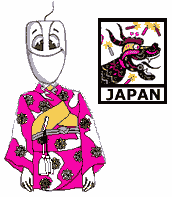Japanese
are normally very punctual for all meetings, so make sure you
are there on time. Formal attire- a dark suit or a white shirt
for men and a business suit for women will be appropriate.
Hierarchy
is followed while entering or leaving a meeting room. The highest-ranking
person is introduced first and the others follow in order of
rank.
Exchange
of business cards is one of the first things that take place
at business meetings. The card should be presented with both
hands, with the right side facing the person who is receiving
it. Read the card carefully (or at least appear to read it)
and handle it with care until the meeting is over. Mention your
company and your designation in the conversation that follows.
Maintain surface harmony at all costs,
refrain from raising any objections in meetings.
Social
and Dining etiquettes
•
Silence during conversations is not
considered odd- it is just a moment spent in thinking, assimilating
and formulating an
appropriate response. Don’t try to break the silence,
as it would signify insincerity.
•
The Japanese
‘Poker face’ is a mask to conceal negative emotions.
It is also considered rude if you are too
expressive or emotional. Direct eye contact too many times should
be avoided. Refrain from any form of physical contact.
•
You may have
to sit on the floor if a traditional Japanese family invites
you to dinner. Mini skirts would be impractical. Make sure you
wear shoes that can be slipped on easily.
•
Remove your footwear before entering a house; especially
if it is a tatami (straw matted) house, you will be given glass
slippers to wear. Use bathroom slippers when you visit the toilet
(they are usually kept just inside the restroom) and do not
exit the bathroom wearing these slippers.
•
Tea drinking
is a common practice. Pour tea into the other person’s
cup before filling your own. If you do not wish to have it,
just take a sip and leave it as it is.
•
After you have
seated yourself at the table you will be offered an o-shibori
or a damp towel- use it to wipe your hands. Wait for the host
to serve you- the concept of “help yourself” does
not. Don’t begin to eat before the host says “Dozo”
or “Please”. Before you start eating say "Itadakimasu"
(meaning: I will receive) and end with "Gochiso sama deshita"
(meaning: Thank you for the feast).
•
While eating
soups and watery preparations, it is a Japanese custom to slurp,
especially when it is hot. This is an appreciative gesture and
signifies that you enjoy the host’s preparation. Small
bowls of soup or rice can be lifted to the mouth and eaten.
Smoking while eating is a common practice so don’t be
alarmed or upset if your host insists on smoking.
•
Don’t use
chopsticks to spear food (use toothpicks instead). Don’t
stick them in the food vertically.
•
While at a restaurant
you don’t have to tip the waiter.
Gift giving
Gift giving is
an important custom in Japan. Anyone planning to make a trip
to Japan should carry a reserve of gifts. Money, food, chocolates
and candy, tea, coffee, liquor, household goods are some of
the things that can be gifted. Gifts can be given to business
associates, new friends, people you may be staying with, or
when you visit Japanese homes. Gifts are given on special occasions
and during gift giving seasons (in May and December).
Wrapping the
gift is a must. Do not give gifts in sets of four or six as
it is considered unlucky, the Japanese word for four also means
death. Never give items that symbolize severing such as knives,
scissors etc. Gifts should be returned with a thank you gift,
usually half the value of the original gift.
Traveling to a new destination is always
exciting. Knowing a little about the etiquette of the people
will help do the right things without offending anyone and make
your trip both successful and enjoyable.

